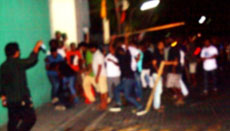Countries across the world have blasted the Maldives for it’s politicized judiciary and expressed alarm over threats to journalists and human rights defenders at a UN periodic review of human rights in Geneva today.
The imprisonment of former president Mohamed Nasheed on terrorism charges was also noted with concern by Norway, Germany, the United Kingdom, Denmark, the United States, Canada and Australia.
But many countries welcomed new anti-torture laws and laws protecting migrant worker and women’s rights in the Maldives, and applauded progress in healthcare and education.
The UN’s Universal Periodic Review (UPR) comes amidst heightened international scrutiny of the Maldives over political turbulence triggered by Nasheed’s arrest in February. Hundreds were arrested this weekend in a 20,000 strong anti-government protest.
Foreign Minister Dunya Maumoon said the Maldives is training and building capacity of judges, and said criticism of Nasheed’s trial had “mainly focused on the process and not the merits.”
Many countries also slammed the Maldives for the Supreme Court’s decision to try members of the Human Rights Commission of the Maldives (HRCM) for treason over a submission to the UPR.
Despite the strong criticism, the foreign ministry in a statement tonight said the human rights council had “praised Maldives for the tremendous progress it has achieved in the promotion and protection of human rights.”
Judicial reform
Expressing concern over a “lack of respect for the most basic principals of fair trial and due process” during Nasheed’s trial, Norway called on the Maldives to release the opposition leader immediately.
Germany noted a climate of growing fear in the Maldives due to increasing gang related violence, religious intolerance, and attacks and death threats faced by journalists, politicians and civil society groups.
The UK meanwhile called on the Maldives to ensure administration of justice is “fully consistent with international human rights standards” and take urgent action to protect journalists, NGOs and to investigate and prosecute individuals behind the threats.
The UK also expressed concern over arrests of opposition leaders during the mass antigovernment protest on May 1, and called for dialogue between the government and opposition parties.
Denmark noted irregularities and rushed processes in Nasheed’s trial, and recommended the “Maldives restore confidence in its legal system by ensuring the clear and unambiguous division of powers, including the indisputable independence of its judicial processes and judges.”
The United States urged the Maldives to end politically motivated prosecutions, including the Supreme Court’s prosecution of members of the human rights watchdog.
The US said it was concerned about fair trial guarantees and said Maldives must strengthen the independence of the judiciary by reforming the process by which the judicial watchdog – the Judicial Services Commission – selects and appoints judges.
Adding its voice to calls for Nasheed’s release, Canada said Maldives must reaffirm its commitment to democracy and rule of law, and institute an independent bar association.
Meanwhile, India said the judiciary must adhere to due process to maintain public trust and said the space for legitimate political dissent must be safeguarded.
Botswana, Brazil, Argentina, Slovenia, New Zealand, Ghana, Switzerland, Italy, Ireland, South Korea, Bangladesh, Liechtenstein, Netherlands, Trinidad and Tobago, Kenya and France also spoke on the need for judicial reform.
International spotlight
Responding to criticism of Nasheed’s trial, foreign minister Dunya said the case “has highlighted the profound need to work together and strengthen oversight institutions, including the judiciary and the need to bring urgent reforms to the judiciary.”
She censured Nasheed for his decision not to seek an appeal, stating appellate courts were set in place to address shortcomings by the lower courts.
Nasheed’s lawyers had decided not to appeal after the criminal court failed to provide the necessary documentation within a shortened ten-day appeal period. The opposition leader has instead appealed to president Abdulla Yameen to reduce his sentence and release him through special procedures in the Clemency Act.
On the Supreme Court’s prosecution of the human rights commission, the Maldives representative in Geneva, Geela Ali, declined to comment, stating: “as the matter is yet to be decided, we deem it inappropriate to comment on the matter just yet.”
The charges were brought in September last year under new suo moto regulations that allow the Supreme Court to prosecute and pass judgment. The case is still pending.
Dunya said the Maldives had formulated a judicial sector strategic action plan with new benchmarks for increasing efficiency, effectiveness and public confidence in the judiciary.
“Almost everyone seems to have something to say, about what they think is good for the Maldives. As a result, every baby step that the Maldives takes is fiercely debated all over the world, including in the corridors of power in key capitals,” she said.
“It is easy to criticize, but we urge you to not only do that: invest in us, bring about meaningful change.”
She insisted Maldives’ institutions must have the space to grow organically, and said meaningful democratic change cannot be imposed. Change “can only be sustained if the change is locally owned, locally driven and locally shaped,” she said.

